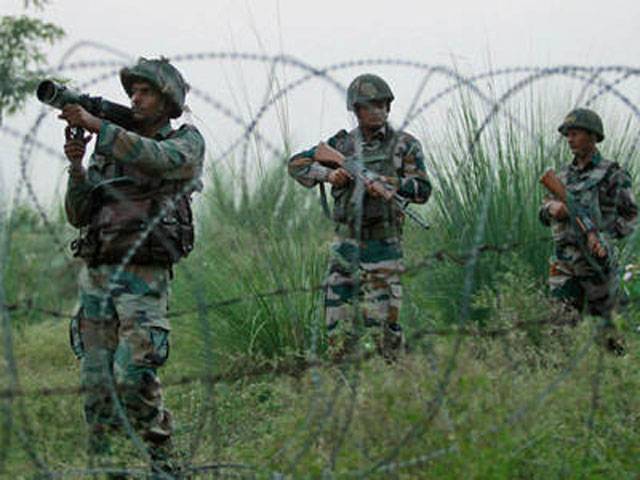ISLAMABAD - Pakistan has asked India to stop firing along the Line of Control and the Working Boundary before “it is too late” and “things get out of control”, diplomatic sources said.
Tension between Pakistan and India escalated this week amid skirmishes along the LoC and the Working Boundary and the Indian deputy high commissioner has been summoned to the foreign ministry for five times since Monday for lodging protess.
Senior officials at the foreign ministry told The Nation that Islamabad had contacted New Delhi over the continuous firing by the Indian forces along the LoC and the WB, which could get “worse”, if not controlled.
An official said: “We have asked them to stop the firing as it was resulting in civilian deaths mounting [public] pressure [on Pakistan] for retaliation. They have been asked not to test our patience.”
He added: “India is blaming Pakistan for the tension, which is ridiculous. We have only been retaliating [to their firing].”
Meanwhile, on Sunday, Director-General South Asia Dr Mohammed Faisal summoned the Indian Deputy High Commissioner JP Singh and condemned the unprovoked ceasefire violations by the Indian occupation forces along the LoC and the WB.
The foreign office has summoned India's Deputy High Commissioner JP Singh five times since Monday. This was the third time in three days, Singh was summoned.
The latest violation by Indian forces occurred on January 20-21, when 18 Indian posts resorted to unprovoked firing with mortars and heavy weapons in the Nikial sector at the LoC.
“Resultantly, two innocent civilians Dil Mohammed, 33 years old and Nafeesa, 25 years old died,” a foreign ministry statement said.
It added: “Sahiba 26 years, Noor, age six months and Naseema age 38 years were injured and evacuated to the District Headquarters Hospital, Kotli.”
The statement said the deliberate targeting of civilian populated areas was indeed deplorable and against the human dignity, international human rights and humanitarian laws.
“The repeated ceasefire violations by India are a threat to regional peace and security and may lead to a strategic miscalculation,” it said.
The director general urged the Indian side to respect the 2003 ceasefire arrangement and investigate the repeated incidents of ceasefire violations.
He asked the Indian side to permit the UN observers to play their mandated role as per the UN Security Council resolutions.
Earlier, Pakistan had asked India not to spread war hysteria as Indian army chief Bipin Rawat made a controversial statement.
General Rawat had claimed Indian army was ready to call Pakistan’s “nuclear bluff” and violate the border to carry out any operation inside Pakistan.
“We will call the [nuclear] bluff of Pakistan. If we will have to really confront the Pakistanis, and a task is given to us, we are not going to say we cannot cross the border because they have nuclear weapons. We will have to call their nuclear bluff,” he added.
Foreign Minister Khawaja Asif and military spokesperson Major General Asif had given a shut-up call to India soon after Rawat’s statement.
Both urged India not to underestimate Pakistan’s military strength.
Last month, Pakistan’s National Security Adviser Nasser Khan Janjua and his Indian counterpart Ajit Doval held an unannounced meeting in Bangkok to build the trust level.
Reports said Janjua and Doval discussed the Kashmir issue, terrorism and overall bilateral ties.
Days before the meeting with Doval, Janjua had said the back-channel diplomacy with India was on where the solution to the tension was being discussed.
On its part, Pakistan had organised a “family reunion” for convicted Indian spy Kulbushan Jadhav, – dubbed India’s “face of terror”.
Jadhav’s mother and wife – Avanti Jadhav and Chetenkul Jadhav –were allowed to sit across a glass barrier for 40 minutes and speak to each other on December 25.
Tensions between Pakistan and India have been high since the killing of a Kashmiri freedom fighter, Burhan Wani, in July 2016.
An attack on Indian forces in September 2016, - that killed 19 soldiers in Uri area of held Kashmir, -- further heightened the tensions.
Foreign Office spokesperson Dr Mohammed Faisal said Pakistan was a nuclear power and fully capable to respond to any foreign aggression.
The spokesperson however, said Pakistan wanted to sort out all issues with India through talks.
He regretted India’s continuous ceasefire violations on the LoC and the WB, which could threaten peace.
Defence analyst former Lt General Raza Mohammed Khan said since Narendra Modi took over as the Indian prime minister, tension had escalated between the two countries.
He said Modi government had increased ceasefire violations along the LoC and the WB. “They [India] are targeting civilians. They are not allowing [the] UN observers to visit the troubled areas and are expecting Pakistan to accept all their demands,” the analyst added.
Pakistan, he said, was making diplomatic efforts to restrain India from violating ceasefire agreement 2003 “but there is a limit.”
Lt General Naeem Khalid Lodhi, also a defence analyst, said India had increased ceasefire violations after US President Donald Trump’s tweet in which he suspended aid to Pakistan.
“The US-India nexus is a great threat to peace in South Asia. The US is supporting India in its aggression,” he maintained.






